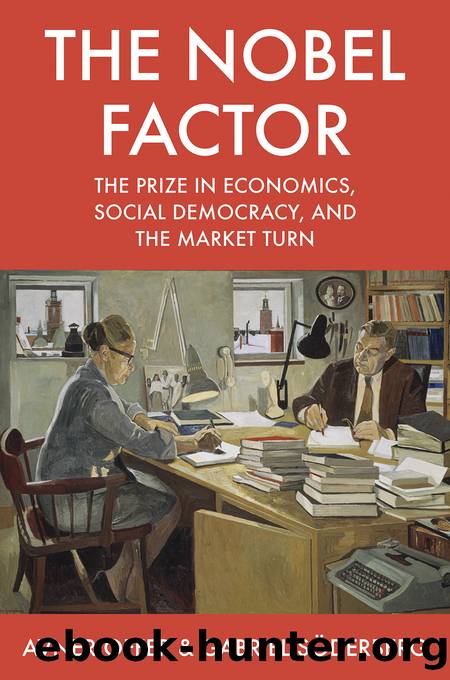The Nobel Factor by Offer Avner;Söderberg Gabriel;

Author:Offer, Avner;Söderberg, Gabriel; [Offer, Avner;Söderberg, Gabriel;]
Language: eng
Format: epub
ISBN: 9780691166032
Publisher: Princeton UP
Published: 2016-09-15T05:00:00+00:00
ASSAR LINDBECKâS DILEMMA
A great deal has been written about Sweden in the 1970s and 1980s, even in English.14 A chronic economic crisis in the 1970s drove voters away from Social Democracy and towards a market liberalism which finally prevailed (for a while) in the 1990s.15 The focus here is on the role of economic theory. For this purpose, the travails of Social Democracy are followed as they affected the public trajectory of Assar Lindbeck (b. 1930), âthe key figure in Swedish economicsâ.16 The discipline of economics in Sweden mostly spoke with one voice in this period,17 so this method provides for a sharp focus and fewer words.
Emerging initially from the heart of Social Democracy, Lindbeck eventually became one of its most vocal opponents. In the early 1950s, he was a student activist and a confidant of Social Democratic ministers. Four decades later, in 1992, a âbourgeoisâ (centre-right) coalition government appointed him to lead an important policy commission, which endorsed and extended the market-liberal agenda that he had advocated for more than two decades. Lindbeckâs career shows how the authority of economic theory shifted the course of policy. It may be regarded as a natural experiment: the eventual failure of the policies he advocated reflects back on the validity of the theory that informed them.
Lindbeck also dominated the selection of Nobel Prize winners during the first twenty-five years of the prize. The prize may not have been his idea in the first place, but he was among the first to be consulted.18 Despite being less than forty in 1969 and not yet a member of the Swedish Academy, he joined the initial Nobel economics selection committee, and remained a member for twenty-five years, far longer than anyone else. For fourteen years between 1980 and 1994, he chaired the committee, and was seen as its kingmaker.19
Face to face, Lindbeck was energetic, charismatic, and likeable.20 In writing, he is powerful and engaged. As director of the Stockholm University Institute of International Economics from 1971 (in succession at one remove to Gunnar Myrdal), he was at the top of the Swedish economics profession, in a position to make and break academic careers, and, according to a Nobel Committee colleague, âa kind of a mafia leader, a fixerâ.21 Lindbeckâs special field was public policy, on which he had strong views, not only as a technical expert, but as a public intellectual, always an advocate for economic reason, with an unremitting flow of books, articles, committee reports, public lectures, newspaper features and broadcasting, some 300 professional and popular publications in all, and another 180 press and media interviews.22
Lindbeck was initially a wunderkind of Swedish public policy. He came from a working-class and Social Democratic family background in the province of Norrland, remote from the capital. His parents were both SAP members, his father an industrial worker who became a local government administrator. Lindbeck excelled as a gymnasium student not only academically, but also in music, literature, and art. At university, he read economics and politics and
Download
This site does not store any files on its server. We only index and link to content provided by other sites. Please contact the content providers to delete copyright contents if any and email us, we'll remove relevant links or contents immediately.
| General | Copenhagen |
Room 212 by Kate Stewart(5087)
The Crown by Robert Lacey(4783)
Endurance: Shackleton's Incredible Voyage by Alfred Lansing(4740)
The Iron Duke by The Iron Duke(4333)
The Rape of Nanking by Iris Chang(4188)
Joan of Arc by Mary Gordon(4076)
Killing England by Bill O'Reilly(3985)
Say Nothing by Patrick Radden Keefe(3963)
I'll Give You the Sun by Jandy Nelson(3413)
Shadow of Night by Deborah Harkness(3337)
Hitler's Monsters by Eric Kurlander(3313)
Mary, Queen of Scots, and the Murder of Lord Darnley by Alison Weir(3188)
Blood and Sand by Alex Von Tunzelmann(3179)
Eleanor & Park by Rainbow Rowell(3138)
Darkest Hour by Anthony McCarten(3111)
Margaret Thatcher: The Autobiography by Thatcher Margaret(3063)
Book of Life by Deborah Harkness(2911)
Red Famine: Stalin's War on Ukraine by Anne Applebaum(2908)
The One Memory of Flora Banks by Emily Barr(2846)
